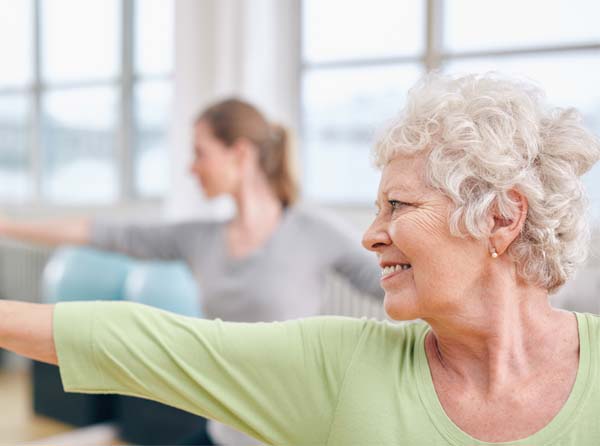The Aging Process
Getting older is a natural part of life and is a gradual and continuous process of change, as many bodily functions begin to gradually decline. The process usually begins in early adulthood and has been known to start as early as your twenties.
With that in mind, people don’t become old or elderly at any specific age. Instead, age is categorised in three different ways:
Chronologic Age: Chronologic age is based on the passage of time, as it is a person’s age in years and has limited significance in terms of health. As chronologic age helps to predict health problems it is often used in legal and financial cases.
Biological Age: Biological age refers to the different changes that commonly happen as someone gets older. As biological age takes into consideration lifestyle, habit and subtle effects of disease it can happen sooner in some people than others.
Psychologic Age: The well known saying “you’re only as old as you feel” can be applied here as psychologic age, is solely based on how a person acts and feels. This means a 75-year-old who works, takes part in activities and looks forward to future events could be considered to be psychologically young.

Normal Aging
As your body starts to age there are some gradual changes you can expect to happen at your body’s own pace. This could depend on your family’s pattern of aging as well as your lifestyle choices, which usually have a more powerful impact on how well your body will age.
Not everyone will experience the following changes when going through the aging process, and a healthy lifestyle could definitely help to slow them down.
Vision
Vision is known to be one of the first things to decline as you begin to age, as several things can occur:
- The lens stiffens, making it harder to focus on objects nearby
- The lens becomes denser, making it hard to see in dim lighting
- It takes the pupil longer to react to changes in light
- The way colours are perceived changes as the lens yellows
- The number of nerve cells decreases, impairing depth perception
- Less fluid is produced so eyes begin to feel dry
Hearing
Hearing loss could develop suddenly, however, when it gradually starts to decline it can be considered another ‘normal’ aspect of aging. Although exposure to noise over time can damage the ear’s ability to hear, some changes in hearing can occur as people age regardless of their exposure to loud noise.
General signs and symptoms of hearing loss could include:
- Difficulty hearing other people clearly or misunderstanding what people say
- Repeatedly having to ask people to repeat themselves
- Having to listen to the television or radio with the volume turned up higher than what people require
- Difficulty hearing the telephone or doorbell
- Regularly feeling tired or stressed from having to concentrate while listening
Skin
Skin can change in many different ways as you age depending on your lifestyle, diet, family history and any other personal habits. The ways in which skin could change with aging include:
- Skin becomes rougher
- Skin becomes loose with the loss of elastic tissue
- Skin becomes more transparent due to the thinning of the epidermis
- Skin becomes more fragile
- Skin is easier to bruise as blood vessel walls start to thin
Hair and Nails
With age, it is normal for hair to gradually thin on the scalp and as hair pigment cells decline in number, grey hair growth will increase. This is considered to be one of the clearer signs of aging and can start as early as your 20’s.
During the aging process nails are most likely to become thick, hard, brittle, develop ridges or start to yellow in colour. Although changes in nails could mean there is an underlying problem, most of these changes are commonly put down to age.
Height
By the time someone turns 80 it is common for them to have lost as much as 2 inches in height as a result of changes in posture and compression of joints, spinal bones and spinal discs; even the gradual flattening of foot arches could contribute!
Sleep
Sleeping patterns naturally change as you get older as adults may experience the following:
- Sleeping for fewer hours and taking longer to fall asleep
- Sleeping less deeply and waking up more often during the night
- Having more trouble adjusting to changes in sleeping conditions, such as a different bed or surroundings
Bones
The skeleton provides support and structure to the body, however, as the body ages changes in posture and gait are common. There are many ways in which bones can change as they age, with some of the common ways including:
- They lose mass and density, especially in women after menopause
- The spine becomes shorter as the disks gradually lose fluid and become thinner
- Vertebrae lose some of their mineral content, causing bones to become thinner
- Foot arches become less pronounced
- Bones in the arms and legs become more brittle due to mineral loss, but they do not change length
- Joints become stiffer and less flexible, or they begin to lose cartilage
Metabolism
Over time, your body will typically need less energy, and so your metabolism will slow down. Hormone changes in the aging body cause a shift, building more body fat instead of muscle mass.
Heart
As a normal stage of aging, the heart will become naturally less efficient, meaning it will have to work a lot harder during activity than it did in the past. As a result, you’ll be able to notice a gradual decline in your overall energy and endurance from one decade to the next.
Lungs
Similar to the heart, lungs will start to become less efficient and supply your body with less oxygen as your body ages.
Brain and Nervous System
Starting in your 30’s your brain’s weight, size and its blood flow will all start to decrease. Memory changes are a normal part of the aging process and it’s common that with your brain’s capacity decreasing you will have less recall of recent memories.

Challenging the Aging Process
Physical Activity
It’s no secret that physical activity brings physical vitality, with each year of your life giving you more to gain from being physically active. Having an active lifestyle has been proven to improve your energy levels, mental sharpness, mood and balance. It is also considered a great aid for managing chronic illnesses and diseases including osteoporosis, osteoarthritis and obesity.
If you have been inactive for a while it’s important not to set your goals too high and start by aiming to move more each day. From there, you can build up to doing more and more to become physically active. It is advised, however, to see your doctor for a full physical examination before you start as they will be able to recommend the best forms of exercises to help you reach your goals.
Nutrition
Good nutrition plays an increasingly important role in the aging process as it can make you feel better, sharpen your mind and help you live longer and stronger.
It has been proven that eating a low-salt and low-fat diet with plenty of fruit and vegetables can also help to reduce age-related risks of heart disease, diabetes or other chronic diseases. To get everything your body needs in order to age well you need to drink plenty of water each day and eat a mix of proteins, carbohydrates and fats.
If you need any help with your diet and how to accommodate your daily intake to your energy levels you can speak to the NHS about seeing a registered dietitian.
Remaining Independent
Challenging the aging process and remaining independent for as long as possible is something everyone wants to be able to do, with 82% of people saying they would prefer to stay in their own homes as they age.
Although many people are not able to remain safely in their own home – assisted living aids, adaptations and OT support can allow a large proportion of people to remain independent for as long as they possibly can. Common assisted living aids could include:
- Bathing aids – grab rails, non-slip mats, bathing cushions and shower seats
- Dressing – orthopaedic shoes, long-handled devices to help with buttons and specialist clothing with Velcro fastenings
- Bedroom aids – Pillow lifts, Leglifters and pressure relief
- Furniture – Beds, chairs and bath stools
- Kitchen aids – Easy to use tin openers and utensils, kettle tippers, non-slip mats and chopping boards
- Mobility aids – Walking sticks and frames, wheelchairs, lifting cushions and scooters
- Safety – Personal alarms, grab rails, grabbers, safe patient lifting devices and reachers
- Daily living – telephones with large displays, clocks and watches and medication management
For more information on the ways in which Mangar Health could help you stay independent in your own home, please get in touch.




